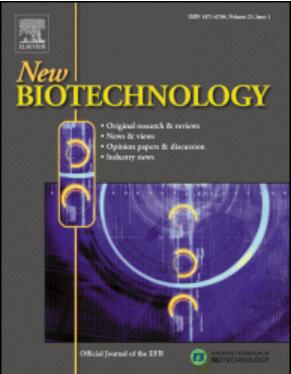Monoclonal antibodies production in microbial systems: Current status, challenges and perspectives
IF 4.9
2区 生物学
Q1 BIOCHEMICAL RESEARCH METHODS
引用次数: 0
Abstract
Monoclonal antibodies (mAbs) serve as indispensable tools in diagnostics, clinical therapeutics, and biomedical research. However, their large-scale production faces significant challenges due to the high costs and lengthy timelines associated with conventional mammalian cell-based expression systems. Microbial expression platforms have emerged as a transformative alternative, offering cost-effectiveness, rapid cultivation cycles, and superior genetic tractability for industrial-scale monoclonal antibodies production. Recent advances in Clustered Regularly Interspaced Short Palindromic Repeats (CRISPR)/Cas9-mediated gene editing enable precise metabolic engineering of host strains to enhance protein folding, secretion efficiency, and translational accuracy. Synthetic biology approaches facilities the reconstruction of mammalian glycosylation pathways in microbial systems, yielding monoclonal antibodies with near-native structural integrity. Furthermore, AI (artificial intelligence)-driven optimization of expression vectors, promoter systems, and culture conditions, combined with high-throughput screening of engineered strains, significantly accelerates the identification of high-yield production clones. This review comprehensively examines current progress in microbial expression systems, strain engineering strategies, and fermentation optimization for enhanced monoclonal antibodies production, while critically discussing existing limitations and potential solutions to advance the field.
微生物系统中单克隆抗体的产生:现状、挑战和前景
单克隆抗体(mab)是诊断、临床治疗和生物医学研究中不可或缺的工具。然而,由于与传统的哺乳动物细胞表达系统相关的高成本和漫长的时间,它们的大规模生产面临着重大挑战。微生物表达平台已经成为一种变革性的替代方案,为工业规模的单克隆抗体生产提供了成本效益、快速的培养周期和优越的遗传可追溯性。CRISPR (Clustered Regularly Interspaced Short Palindromic Repeats)/ cas9介导的基因编辑技术的最新进展使宿主菌株的精确代谢工程能够提高蛋白质折叠、分泌效率和翻译准确性。合成生物学方法在微生物系统中重建哺乳动物糖基化途径,产生具有接近天然结构完整性的单克隆抗体。此外,AI(人工智能)驱动的表达载体、启动子系统和培养条件优化,结合工程菌株的高通量筛选,显著加快了高产生产克隆的鉴定。本文综述了目前在微生物表达系统、菌株工程策略和发酵优化方面的进展,以增强单克隆抗体的生产,同时批判性地讨论了现有的限制和潜在的解决方案,以推进该领域的发展。
本文章由计算机程序翻译,如有差异,请以英文原文为准。
求助全文
约1分钟内获得全文
求助全文
来源期刊

New biotechnology
生物-生化研究方法
CiteScore
11.40
自引率
1.90%
发文量
77
审稿时长
1 months
期刊介绍:
New Biotechnology is the official journal of the European Federation of Biotechnology (EFB) and is published bimonthly. It covers both the science of biotechnology and its surrounding political, business and financial milieu. The journal publishes peer-reviewed basic research papers, authoritative reviews, feature articles and opinions in all areas of biotechnology. It reflects the full diversity of current biotechnology science, particularly those advances in research and practice that open opportunities for exploitation of knowledge, commercially or otherwise, together with news, discussion and comment on broader issues of general interest and concern. The outlook is fully international.
The scope of the journal includes the research, industrial and commercial aspects of biotechnology, in areas such as: Healthcare and Pharmaceuticals; Food and Agriculture; Biofuels; Genetic Engineering and Molecular Biology; Genomics and Synthetic Biology; Nanotechnology; Environment and Biodiversity; Biocatalysis; Bioremediation; Process engineering.
 求助内容:
求助内容: 应助结果提醒方式:
应助结果提醒方式:


